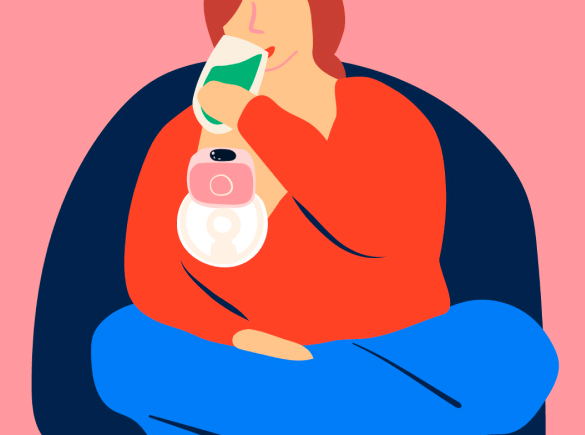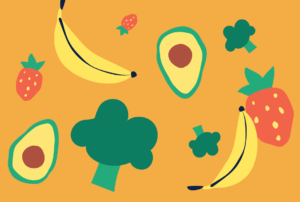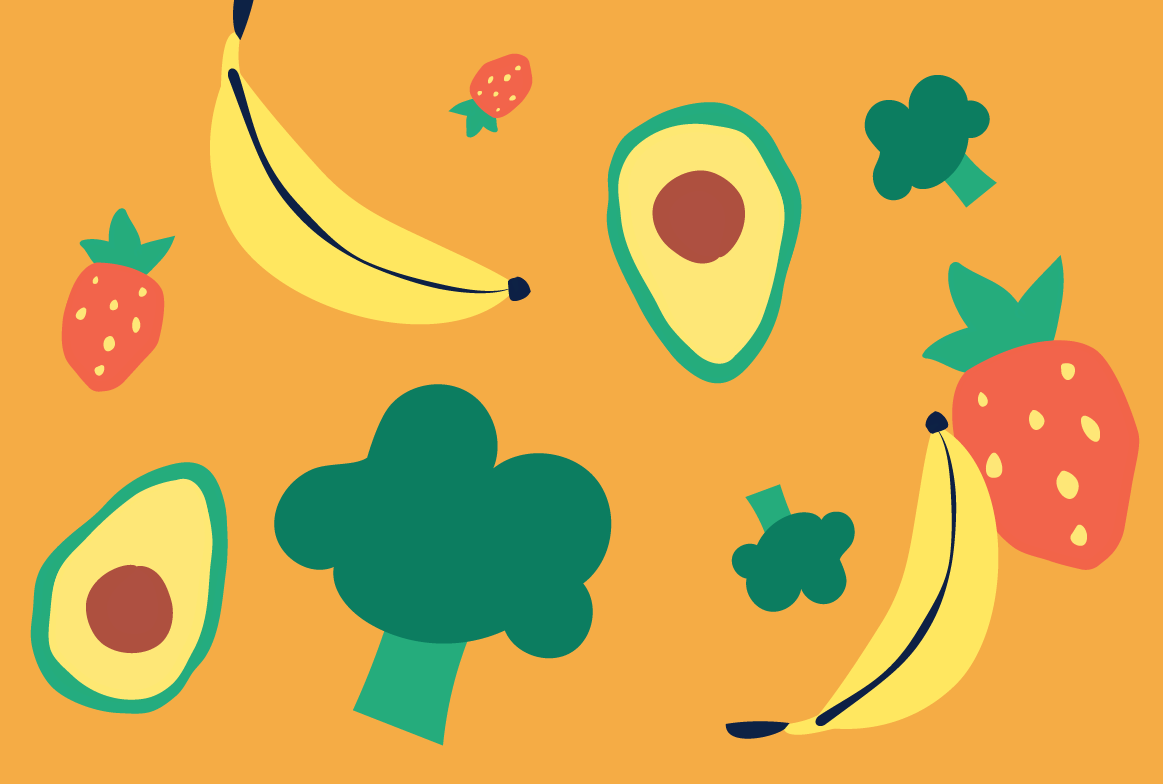Inside this article
Welcome to motherhood!
Mums often put their own health at the bottom of the priority list, but keeping well is essential if we are looking after others. Especially when it comes to taking care of little humans who rely on us for food, love and of course, fun! So if you’re after information and tips on how to stay fit and healthy as a new mum, read on.
In addition to sleep (which can often be lacking in new mums) and physical activity. Food has the ability to either hinder or help our efforts in making the most out of our day. If we don’t eat enough or eat poorly then we may not have the energy or ability to concentrate on the task in hand. Eat a nutritious, balanced diet, and we will thrive, even if we’ve only had 4 hours worth of broken sleep! What we eat also plays a huge role in how we heal and our immune function. Both of which are essential when we have little ones to care for.
Eating for breastfeeding
Certain nutrients as well as energy requirements increase during breastfeeding. The total amount of extra energy needed though can vary between mothers. Depending on pre-pregnancy weight, how active you are and if you are combi-feeding. Although there are no definitive recommendations, energy requirements generally increase by around 300 to 500 calories a day whilst breastfeeding. This is depending on how often you are feeding. To put this into practice, and as our calcium and protein requirements also increase, it may be beneficial to consider including an extra source of high quality protein and calcium. Such as a portion of Greek yoghurt or a smoothie made with fruit and milk, to meet the extra energy and nutritional requirements needed.
With the exception of the increased requirements for calcium, iodine, folate and vitamin D during breastfeeding. Where we need to consider upping our intake of some of the main sources of these foods (as discussed below). The good news is we can still follow the usual principles of a healthy and balanced diet to keep up our energy levels and immune system whilst breastfeeding.
Create a balanced meal, aiming for around a third of your plate to be filled with vegetables or salad, a third of your plate for starchy carbohydrates (aim for higher fibre options the majority of the time), and a third for your protein source. Use a small portion of healthy fats. Such as a drizzle of olive oil, half an avocado or a sprinkle of nuts and seeds to provide a dose of heart-healthy unsaturated fats. Regular meals are essential for sustaining energy levels and sitting down to eat as a family. This can help everyone to eat mindfully. As well as encouraging children to try new foods (if you have an older child).
Nutrients for breastfeeding
Calcium
- Calcium helps maintain healthy strong bones, teeth, regular muscle contractions and normal blood clotting. Try to have 4 to 5 rich sources of calcium throughout the day.
- Breastfeeding mums require 1250 mg of calcium per day (increased from 700 mg).
- Good sources: Dairy milk, yoghurt and cheese, tinned fish with bones (such as sardines). Or, plant-based sources including fortified milk, yoghurt or cheese alternatives, bread and cereals, orange juice, dried fruit, pulses, broccoli, oranges and tofu (must be set with calcium).
Iodine
- Iodine is used by the thyroid gland to produce vital hormones for growth and health. It helps to regulate our metabolism and is essential for healthy development of the baby’s brain during pregnancy.
- Breastfeeding mums require slightly more than the average daily requirement (200 mcg vs 150 mcg).
- Good sources: White fish such as cod and haddock are one of the richest sources of iodine (approx 200 mcg per portion). As well as milk, yoghurt and other dairy products or fortified alternatives. Smaller amounts of iodine are found in cheese, eggs, meat and poultry.
Protein
- Protein is a fundamental element of cell structure and healthy functioning of cells and tissues within the body. Including growth and repair. Aim to have 1 source of protein at each meal as well as 1-2 snacks in the day.
- Breastfeeding mums may require a little more protein than a standard adult – however most women eat enough protein. Standard protein recommendations are based on how much we need per kilogram (kg) of our bodyweight, for adults this is 0.75g per kg of bodyweight (or more in those who are more active).
- Good sources: Animal sources of protein such as lean meat, fish, dairy and eggs contain all of the essential amino acids that our body needs. As well as soya products and Quorn. Plant-based sources include beans, pulses, nuts and seeds. Which in combination can still provide all of the essential amino acids you need.
Vitamin D
- Vitamin D is needed to stimulate the cells that fight infection. We get some vitamin D from the sun (in the summer months) on our skin. Adults in the UK are recommended to take 10mcg of vitamin D in the autumn and winter months.
- Mums who are breastfeeding should take 10 mcg of vitamin D every day, irrespective of the season.
- Good sources: Oily fish such as salmon, mackerel and sardines are rich food sources of vitamin D. As well as eggs. Plant-based sources include fortified breakfast cereals and dairy alternatives as well as mushrooms (especially those which have been exposed to daylight).
Folate
- Folate plays an important part in the development of healthy red blood cells and the body’s nervous system. It’s also important for the development of DNA.
- It’s not required to supplement during breastfeeding. But. requirements do increase to 260 mcg per day (200mcg is the adult recommendation).
- Good sources: We get most of our folate requirements from fruit and vegetables. Especially dark green leafy vegetables, beans and legumes, poultry, yeast and beef extracts and most fortified breakfast cereals and breads.
Foods to be cautious of when breastfeeding
Unless your baby is sensitive to certain foods, such as cow’s milk. The list of foods and drinks to be wary of when breastfeeding is not extensive. However, there are three main ones to consider:
Caffeine
Whilst breastfeeding it’s recommended to have no more than 200 mg of caffeine a day (NHS). Or, ideally, less during the first few months of the baby’s life (you may want to avoid drinking it before bed and nap time to help with your baby’s sleep, too). This is the equivalent of no more than two instant coffees or cups of tea a day. Don’t forget that energy drinks (150mg or more) or drinks such as diet coke (40mg/can) or foods such as chocolate (up to 50mg per 50g bar) also contain caffeine! Read our full blog about caffeine and breastfeeding here.
Alcohol
The NHS advise to drink only in moderation and with caution i.e. the occasional drink. Such as a small glass of wine, once or twice a week, two hours before you breastfeed. If you do decide to have more alcohol, a good tip is to consider expressing beforehand and bottle feeding it after. The NHS advise waiting 2-3 hours after each drink before breastfeeding. More info on alcohol and breastfeeding can be found here.
Fish
Due to the potential amount of mercury or pollutants found in fish, it’s recommended not to consume more than two portions of oily fish a week. Such as salmon, sardines, mackerel or trout. As well as some other white fish such as sea bream and sea bass. Additionally, fish such as shark, swordfish or marlin should be limited to once a week. This is not to say you need to feel anxious about consuming fish altogether. Both oily and white fish are great sources of essential nutrients that we need to obtain when breastfeeding, such as omega-3 fatty acids, iodine and protein.
Breastfeeding – Frequently Asked Questions
Should I be taking a supplement?
In comparison to the recommendation of a 10 mcg supplement of vitamin D in the winter months only (October to April) for the general population. Breastfeeding mums require a daily 10 mcg supplement of vitamin D all year round. This is in addition to vitamin D drops for your baby from birth. Unless they are having more than 500ml of formula a day. With the exception of vitamin D, there are no specific requirements for multivitamins. If you consume a well-balanced (and colourful!) diet, being careful to ensure you are obtaining sufficient dietary sources of calcium, iodine, folate and protein in particular.
Could my diet cause my baby to have an allergic reaction?
One of the most common childhood allergies is cow’s milk protein allergy (CMPA). Which is more common if formula milk is introduced. It is also possible for your baby to absorb cow’s milk through breast milk. Cow’s milk is a rich source of calcium, iodine, and protein. All nutrients that we need to obtain more when breastfeeding. Unless you are lactose/dairy intolerant (or allergic), you should not be afraid to include this as part of your diet if your baby does not have symptoms of CMPA. For more information on the full symptoms visit allergy UK. Always consult your GP or health visitor if you suspect your baby has a milk allergy.
Another common allergen that some mums can feel anxious to include within their diet due to risk of causing an allergic reaction is peanuts. However, there is no evidence to suggest you need to remove them from your diet (unless you are allergic!). Similar to suspected symptoms of CMPA, you should always contact your GP or health visitor for further support if you notice any symptoms.
Will being a vegetarian or vegan affect my breastmilk?
It is entirely possible to provide all of the essential nutrients your baby needs from breastmilk when following a vegetarian or vegan diet. However, extra care and attention is needed to ensure all nutritional requirements are being met. As well as a vitamin D supplement, having foods fortified with vitamin B12 or taking a supplement is essential for mums following a vegan diet. As the only natural source of B12 is found in animal products. If you’re vegetarian and are lactose intolerant for example, it would also be advisable to have fortified foods. Or to take a vitamin B12 supplement if dairy consumption is limited. As well as calcium, iodine and protein which have been discussed previously, other nutrients to consider if you’re following a vegan or vegetarian diet include:
Iron
Although less easily absorbed, there are plenty of plant-based sources of (non-haem) iron. Such as, fortified breakfast cereals, dark leafy greens, beans, dried fruit, nuts and tofu that provide us with plenty of other nutrients too. To increase absorption, combine your iron sources and pair with a good source of vitamin C, such as pepper, orange or broccoli!
Omega 3
As one of the richest sources of omega 3 fatty acids is oily fish. It’s important to include plenty of plant based sources throughout the week, such as walnuts, linseeds, chia seeds and rapeseed oil. There are three kinds of omega 3 fatty acids; EPA, DHA and ALA. These are essential fatty acids as we can’t make them in the body. So we need to obtain them through our diet. EPA and DHA are essential for the formation of cell membranes and cell signalling in the brain. However, plant-based sources are richer in ALA, which can be converted to EPA and DHA but in small amounts, so extra care is needed to obtain sufficient amounts. The Vegan Society recommends an amount equivalent to 6 to 12 walnut halves daily for example. Or you could also consider taking an algae based omega 3 supplement.
Additionally When choosing plant-based alternatives, such as milk, yoghurt or cheese, always check that they’re fortified with Calcium, and Iodine before buying.
Breastfeeding Summary
Breastfeeding can be a beautiful but demanding journey that requires extra nutritional support for both mum and baby. Ensuring a balanced diet rich in key nutrients like calcium, iodine, protein, vitamin D, and folate. In addition to staying well hydrated can help maintain energy levels, support recovery, and promote a healthy milk supply. While breastfeeding increases energy requirements, these can be met through nutrient-dense meals and snacks, such as Greek yoghurt with fruit or nut butter on toast.
Mums should also be mindful of certain foods and drinks, such as caffeine, alcohol, and high-mercury fish whilst they are breastfeeding. Supplements, particularly vitamin D, are recommended to ensure optimal nutrient intake. And while a vegetarian or vegan diet is completely viable. Extra attention should be given to nutrients including vitamin B12, iron, and omega-3 sources.
Above all, prioritising self-care and nourishment is essential when looking after a little one. By focusing on a varied and balanced diet, mums can feel their best while providing everything their baby needs for healthy growth and development.









